Adventurers in New England
Chapter Twenty-Six
New Orleans Street Cars, Chalmette
National Cemetery, Mardi Gras Fountain
New Orleans, LA
by
Robin Bowers
July 3, 2015
Friday
Text and Photos by Author
The author retains all
rights. No reproductions are allowed without the
author's consent.
Comments are appreciated at... yr.mmxx@gmail.com
Big Easy
Day One
After a good night's rest, I
was ready to start my first day in New Orleans. Among the first
things to do was to find the breakfast buffet, a featured
amenity here at the Maison St. Charles Hotel and Suites. And
what a fine buffet it was. As usual at these buffets the waffle
station was busy with a line most of the time. You would think
they were giving them away. Oh wait, they are doing that.
Of all the hotel buffets we have encountered these past three
weeks, this is near the tops. Biscuits and gravy, eggs, hash
browns, cold cereal, yogurt plus more. The South and especially
New Orleans take their food seriously, and I had a good big
breakfast to get me prepared for a day of touring and
sightseeing. Mom always preached that you need to start your day
with a breakfast. The buffet was in a room that had a clubhouse
feel and overlooked the pool area and was a quite popular place.
Everyone was brisk in getting their food, eating and getting out
and on with their day.
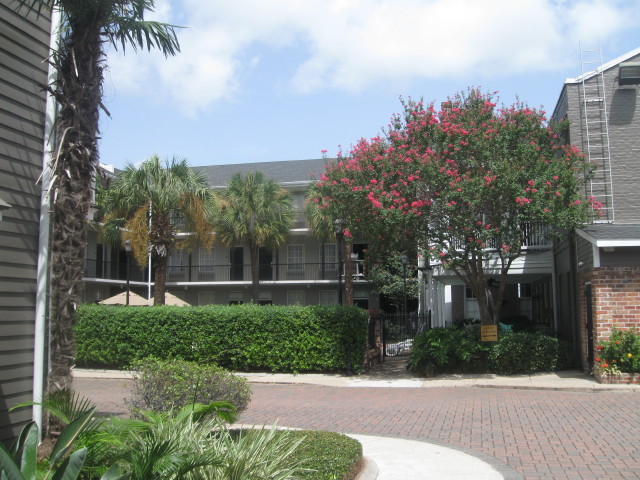
Pool area on the left and building on right is buffet location.
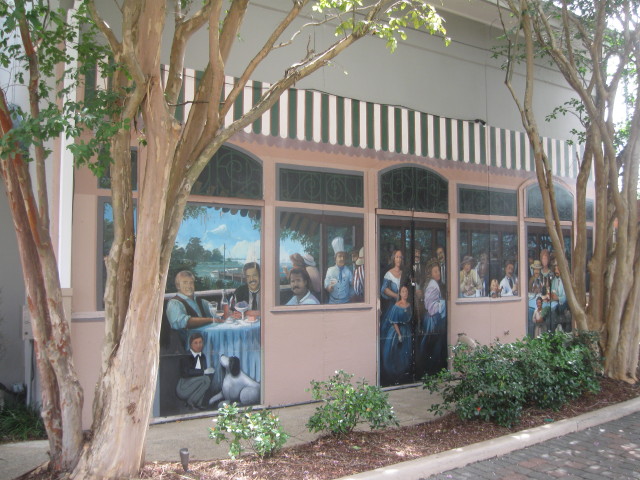
Mural on side of hotel building next to driveway.
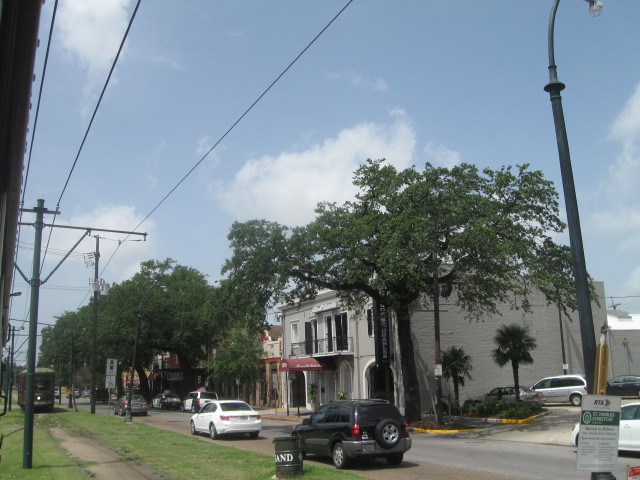
White building on right is my
hotel for this Fourth of July weekend. Maison St. Charles Hotel
& Suites, 1319 St Charles Ave. The streetcar stop is at the
front door and that was one of the reasons for choosing this
hotel. Chris recommend this hotel as it was close to the Amtrak
station with a convenient street car stop in front.
When I was planning this
visit and when I told my cousin, who lives in New Orleans, there
were several things I wanted to do while here. Among which was
to ride the streetcars here, visit the cemetery where my great
grandfather and civil war solider is buried, tour the garden
district, and have a steaming Cafe' Au Lait and beignets at
Cafe' Du Monde in the historic French Quarter.
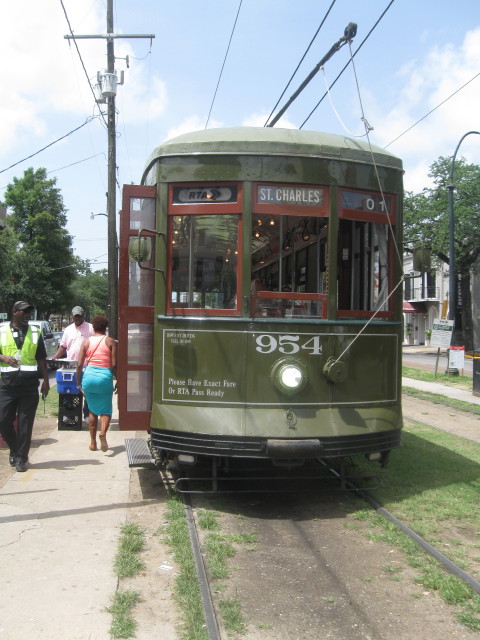
I walked across St. Charles
Ave to the streetcar stop and bought a one day Jazzy pass for
$3.00. My first ride was on 954 to Canal Street and return then
going to the other end of the St. Charles Line.
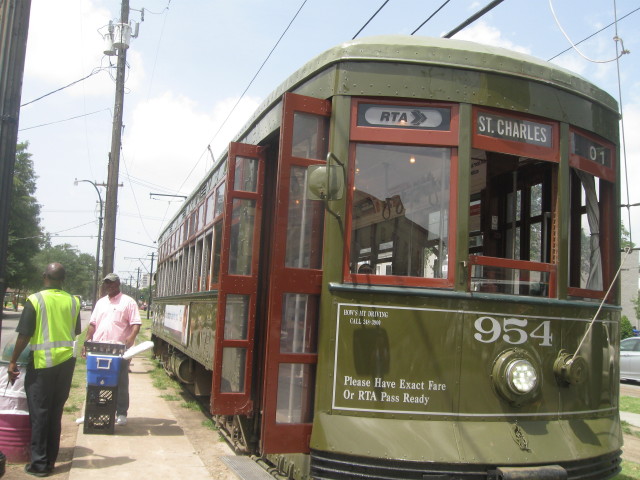
St. Charles Avenue Streetcar
can be boarded at stops along St. Charles Ave. and from the main
boarding location at jct. Carondelet and Canal Sts. The oldest
continuously running street railway, the streetcar is now part
of the municipal transit system. The line itself was built in
1835 to connect New Orleans with the city of Carrollton; 35
olive-green trolley cars date 1923-24.
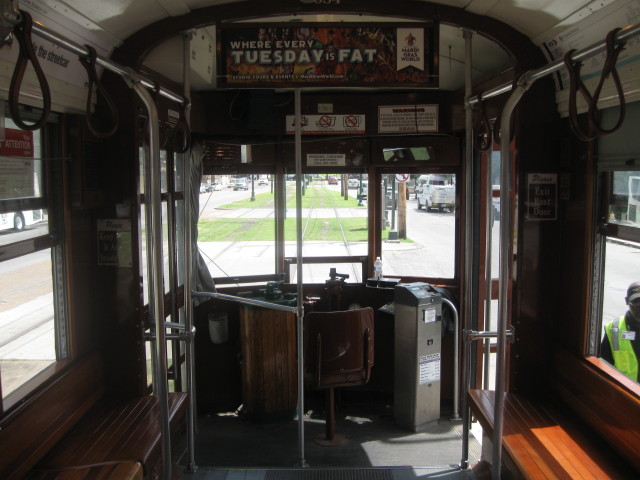
The 13-mile line runs between
Canal Street (near the French Quarter) along St. Charles Avenue
to its junction with Carrollton and Claiborme Avenues with
stops every 2 blocks. It passes the Garden District, the
campuses of Tulane and Loyola universities and Audubon Park.
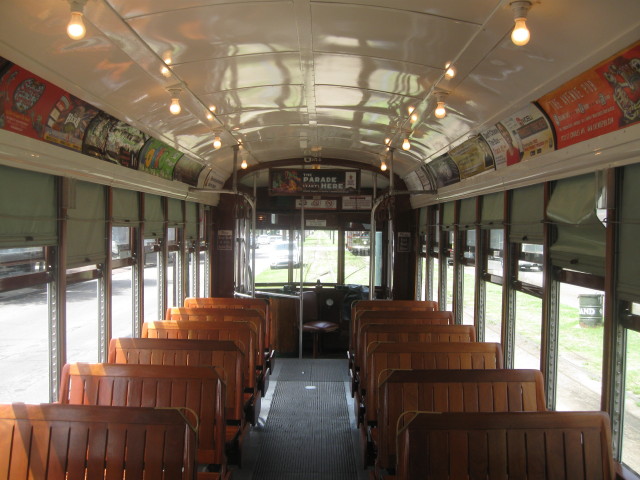
When the streetcar reaches
the end of the line (junction of Canal Street and St. Charles
Ave or junction of Carrollton and Claiborne Avenues), passengers
must exit the car, re-board and pay an additional fare for the
return trip; transfers cannot be used; the full fare must be
paid for each re-boarding.
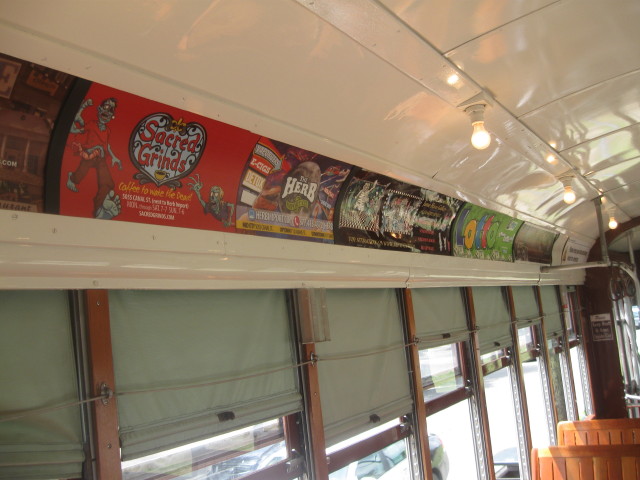
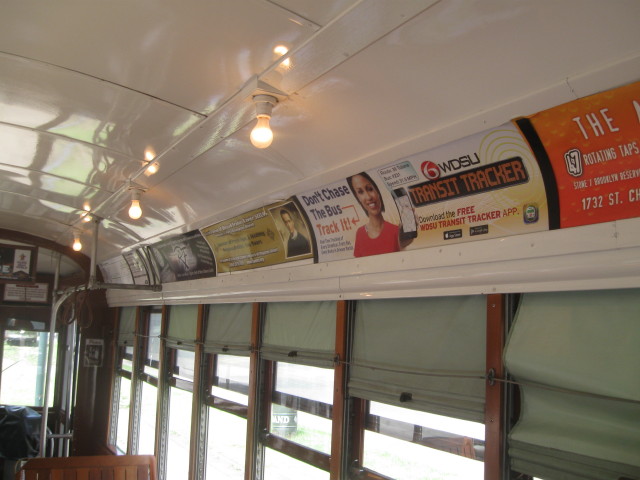
Shortly after boarding, the
streetcar headed north on St. Charles towards Canal St. After
going under Bus US 90, we circle around Lee Monument and head
towards Carondelet St which is one way going to Canal St. After
crossing Canal St., Carondelet St. becomes Bourbon St. in the
French Quarter. St. Charles is one way coming from Canal St. and
is Royal St. in the French Quarter
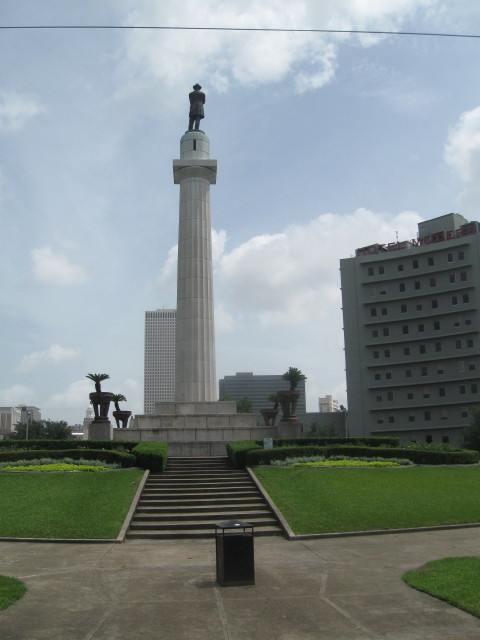
Lee Circle.
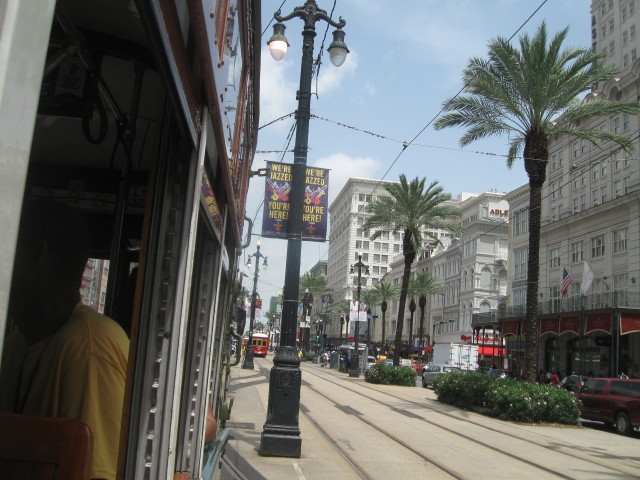
Our streetcar on Canal St.
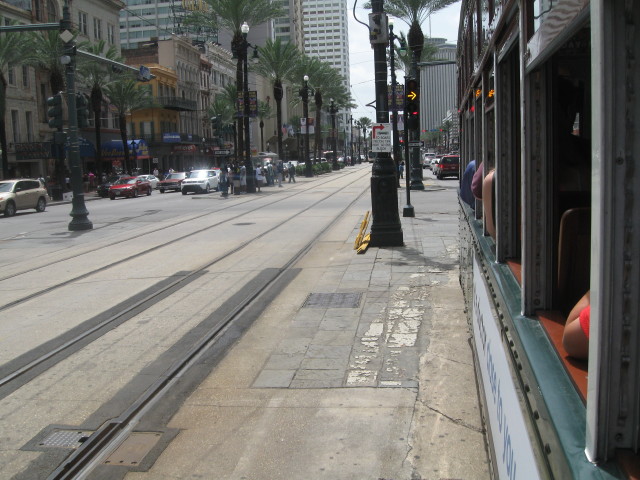
On Canal St with the French Quarter on left.
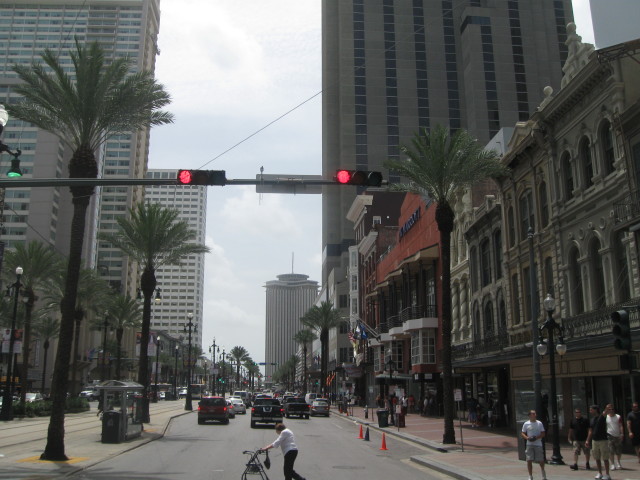
Corner of St. Charles Ave. and Canal St. looking toward the
Mississippi River.
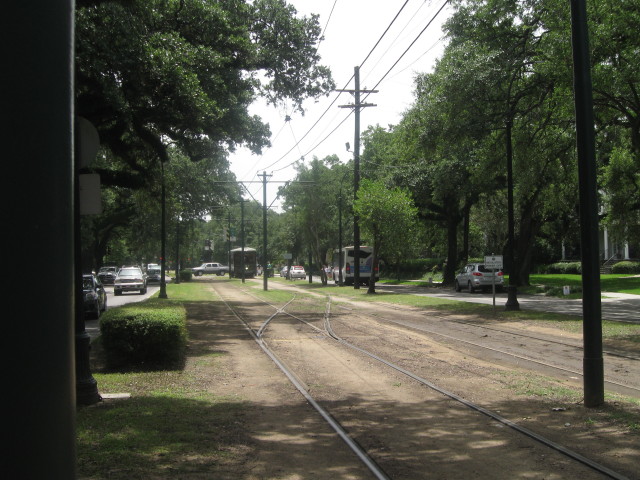
Leaving Canal St. we are back on St. Charles Ave. going around Lee
Circle, then the hotel and pass the garden district. At this point
we have to take a bus bridge around construction of a flood
control project that required the removal of the tracks.
Local lingo - Neutral Ground, the grassy median separating street
lanes.
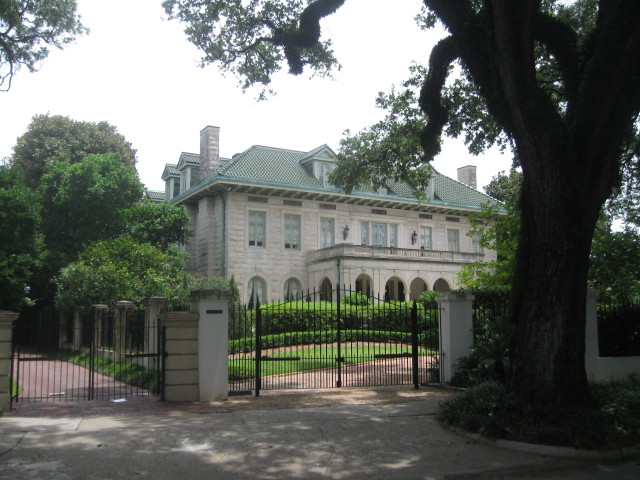
A nice view while waiting at the bus bridge junction.
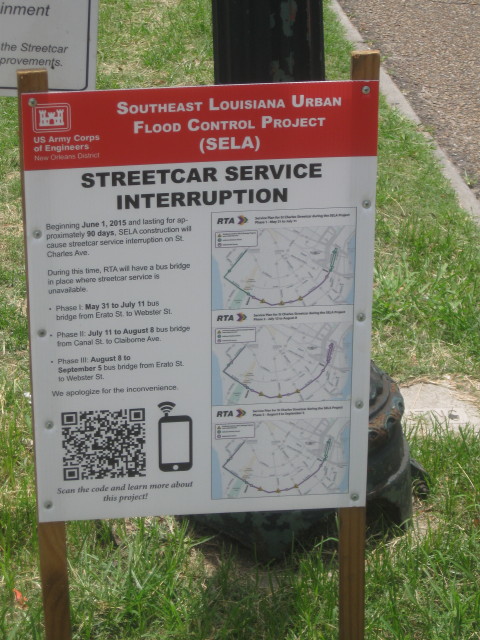
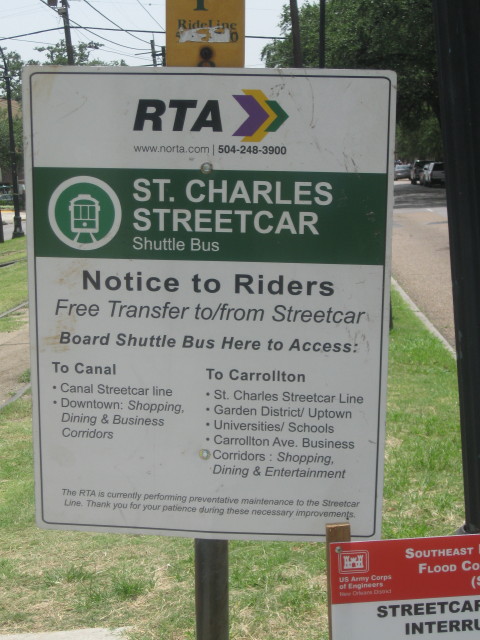
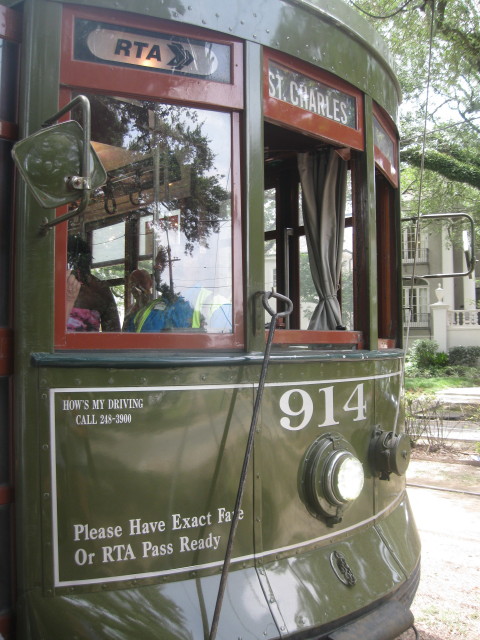
We board 914 to take us to the end of line.
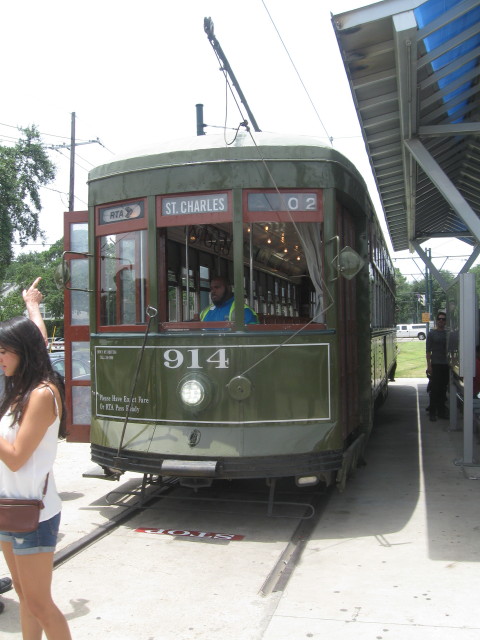
End of line at junction of Carrollton and Claiborne Avenues.
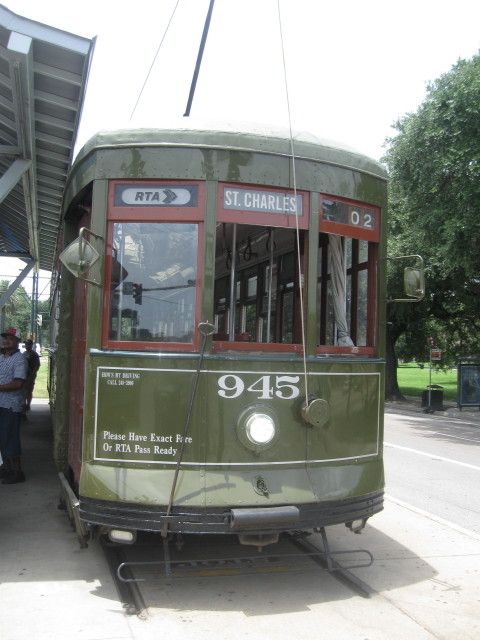
Car 945 waiting to return to the bus bridge.
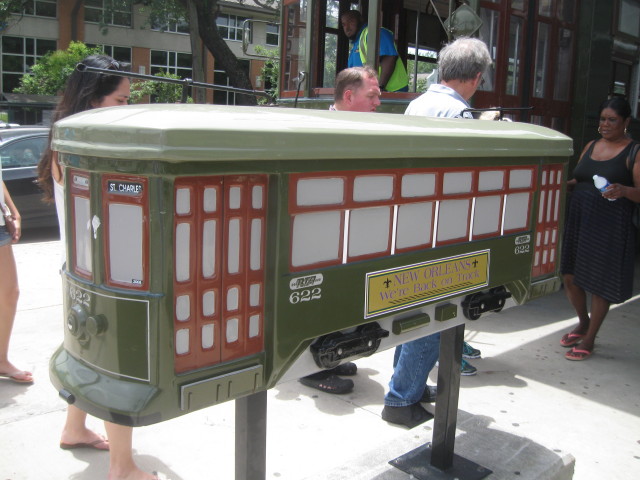
Waiting to board at end of line.
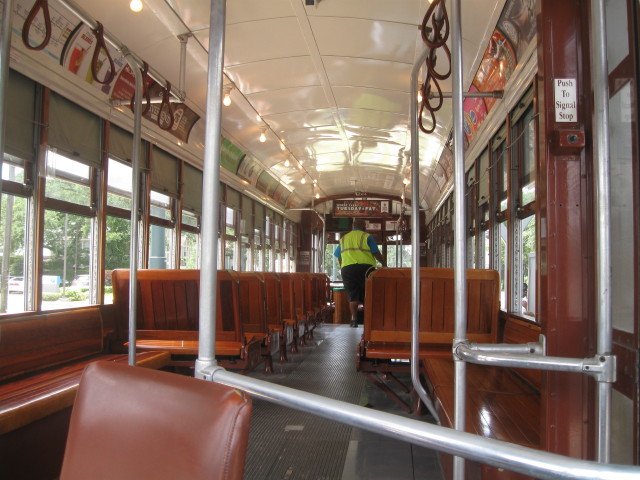
Inside car 914.
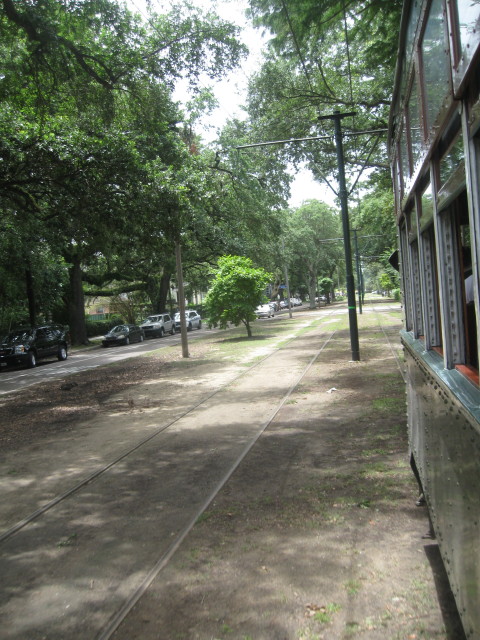
The Carrollton Ave. district neutral ground.
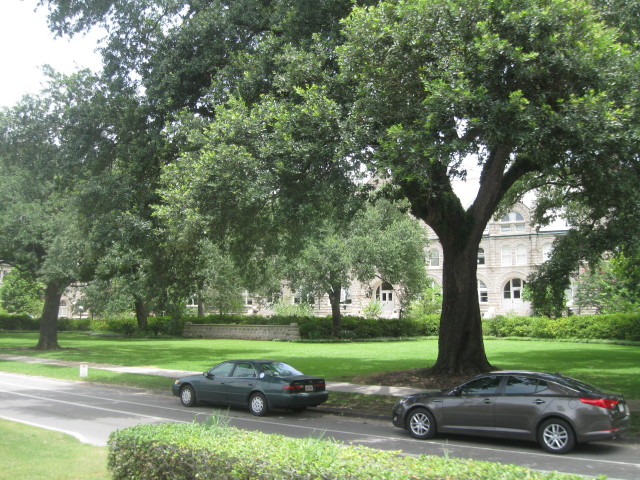
On St. Charles Ave.
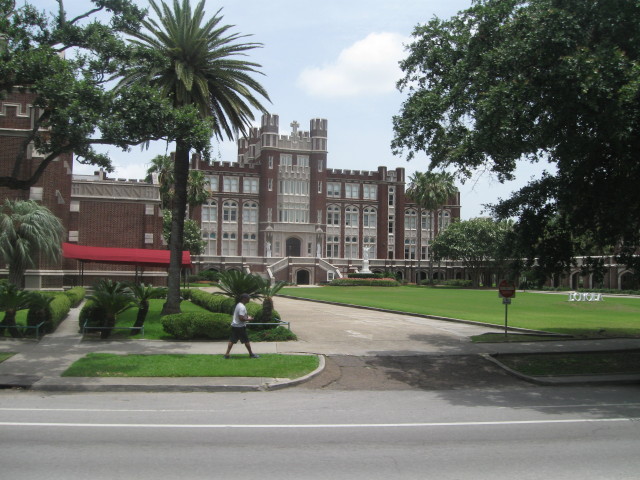
Loyola.
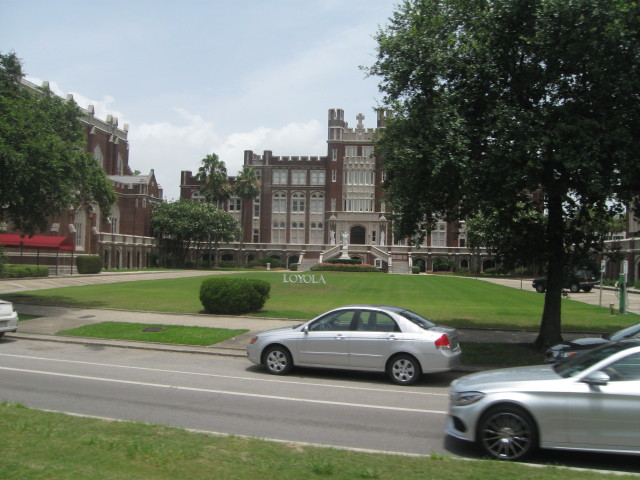
Behind the Loyola campus is the Tulane campus.
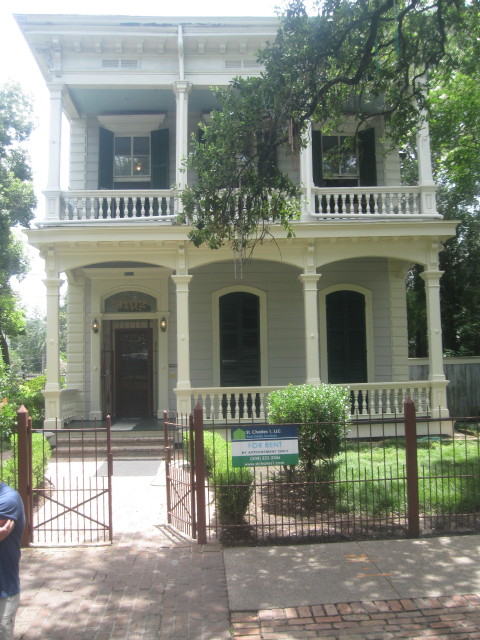
Nice home for rent on St. Charles Ave. in the Garden District.
I had now arrived at my starting point, back at the hotel
streetcar stop. I had completed the entire St. Charles Line.
Across St. Charles and next to the stop was Emeril's.
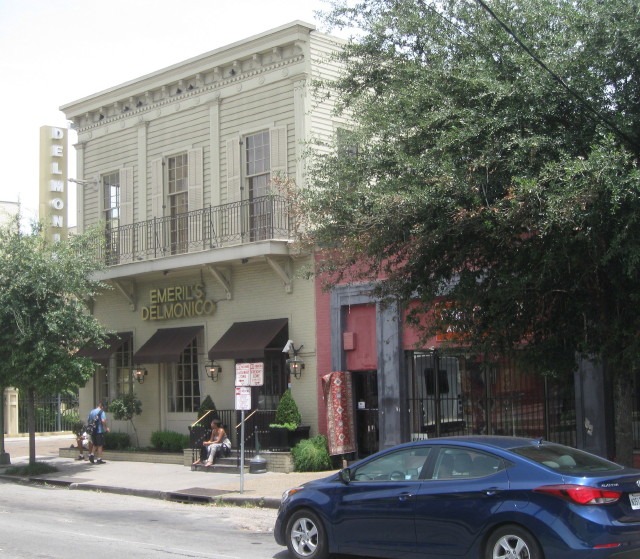
Emeril's Delmonico Restaurant, 1300 St. Charles Ave.
This Garden District eatery
is the celebrity chef's vision of a New Orleans steakhouse. The
service and atmosphere are refined, yet casual and
unpretentious. Housed in a restored two-story building on the
streetcar line, the eatery has high ceilings, upholstered walls,
hardwood floors, and a small lounge with live piano on weekend
nights. The menu focuses on steak, but there also are other
creative options like rabbit crepes, Moroccan spiced lamb
sirloin and a large charcuterie selection.
Chalmette National Cemetery
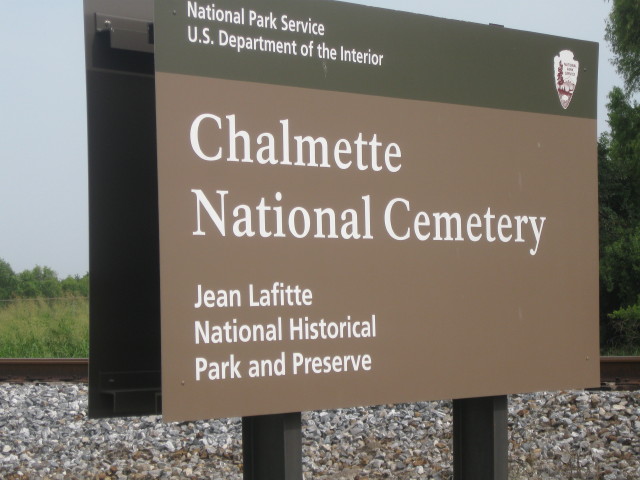
After returning to my room, I talked to my
cousin, Dawn, who said she would be by in an hour or so to take
me to the cemetery which I very much appreciated because there
was no public transportation out there. After her arrival we
chatted a bit and then she noticed the Popeye's next door and
said an order of beans and biscuits sounded really good about
then. We walked in and she ordered and I had the same. After our
snack, we drove to the cemetery going through districts hard hit
by Hurricane Katrina. Many areas had construction and torn up
streets. Some were a result of new work and some from Katrina.
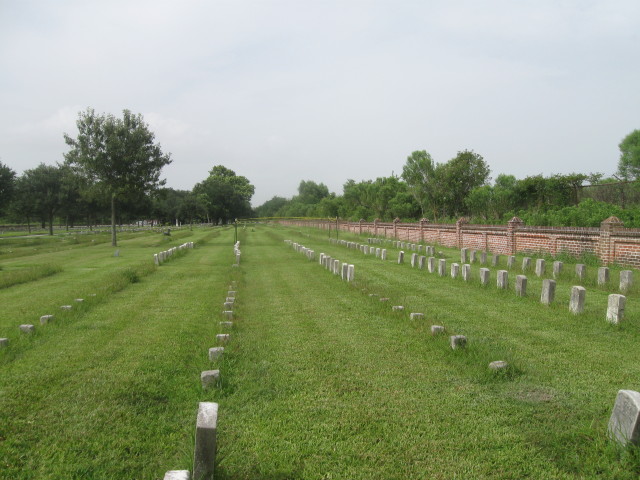
Chalmette National Cemetery
Established in May 1864 as
a final resting place for Union soldiers who died in Louisiana
during the Civil War, the cemetery also contains the remains
of veterans of the Spanish-American War, World Wars I and II,
and Vietnam. Four Americans who fought in the War of 1812 are
buried here, but only one of them fought in the Battle of New
Orleans.
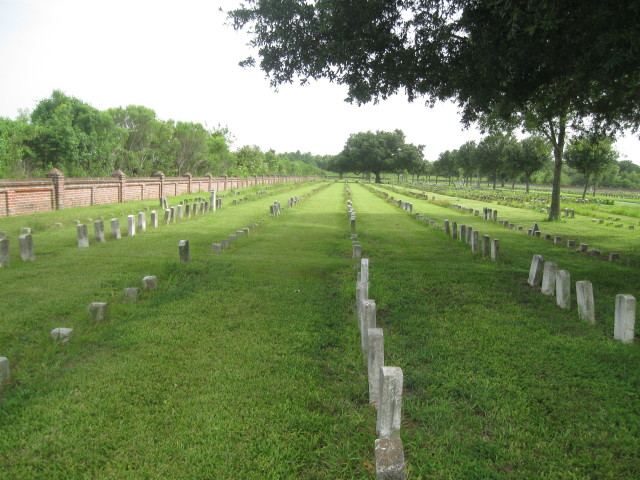
Standing at Levi Saunders grave looking towards the Mississippi
River.
In Springfield, Ohio on
August 20, 1861, 45 year old Levi Saunders enlisted in the
Sixteenth Independent Battery Ohio Volunteer Light Artillery to
serve three years. Joining up at 47 yr old made him almost twice
the age of the other recruits and the fact he had a wife and
four children; I suspect the reason to sign up was for the
wages. His daughter Sarah became the mother of my grandmother:
My Dad's Mom. So he was the grandfather of my grandmother.
Private Saunders saw service in Missouri,
Arkansas and Mississippi. He was at the Siege of Vicksburg. MS,
May 18-July 4, 1863. Assaults on Vicksburg May 19 and 22 with
General Grant. Advanced on Jackson, MS, July 5-10. Siege of
Jackson July 10-17. Ordered to New Orleans, LA, August 21 and on
duty there till he succumbed to tetanus on Oct 26, 1863, Aged
47. His was buried in Carrollton Ave Cemetery, LA. His
passing was very painful and hard according to witness. The
battery lost during service 1 Officer and 1 Enlisted man killed
and 45 Enlisted men by disease. Total 47.
Being a direct descendant of Private Saunders
who served in the War of the Rebellion, I was qualified to
become a member of Sons of Union Veterans of the Civil War. But
I first was elected a member through my great grandfather, my
grandmother's father who first enlisted at 16 years of age as
musician, got shot and returned home and then enlisted three
more times, for enlistment bonuses I am sure. And his ancestor,
George McCreary, born 1752 in County Armagh, Province of Ulster,
Ireland. Enlisted as Private in Pa Mil York Co., May 1, 1776,
joined the "Flying Camp" at Elizabeth NJ. He served under
General George Washington and took part in the battle of Fort
Washington, NY, 1776 and was captured and held prisoner on
British Man-of-war for 2 months in New York City harbor. After
which he was paroled, if he would return home in York Co. PA. I
also have an other patriot grandfather who enlisted from New
Jersey. With these patriots I was able to join the Sons of the
American Revolution.
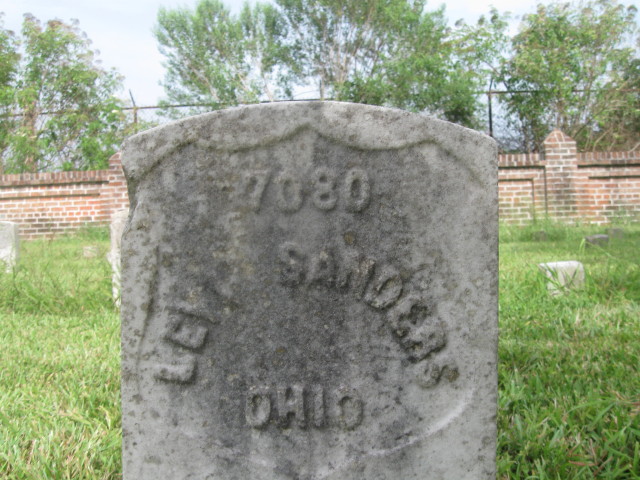
Cousin Dawn had done her reconnoiter work well and knew the
section 86, grave 7080 location. Poor grandpa, they misspelled his
name on his stone and also have his date of death wrong in
cemetery records. Don't think they care to correct their mistakes
either.
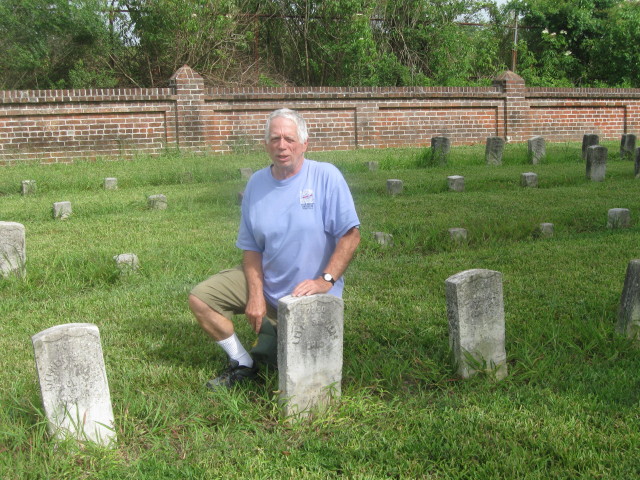
Author at grandfather's grave.
GPS: 29 56.427N 89 59.295W.
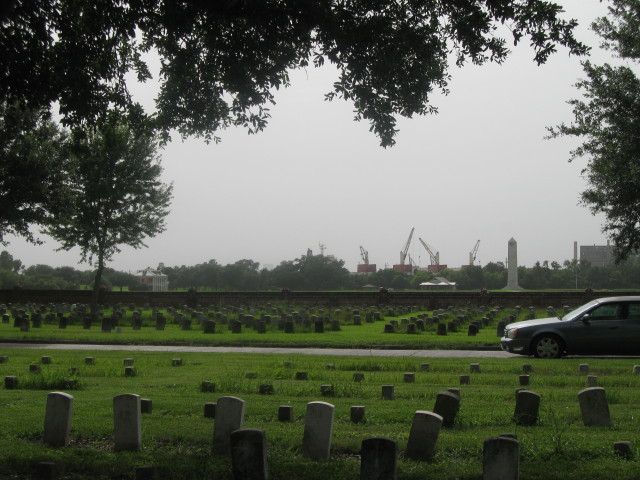
Looking past the National Cemetery and over the Chalmette
Battlefield with Chalmette Monument on the right and
Malus-Beauregard House on left.
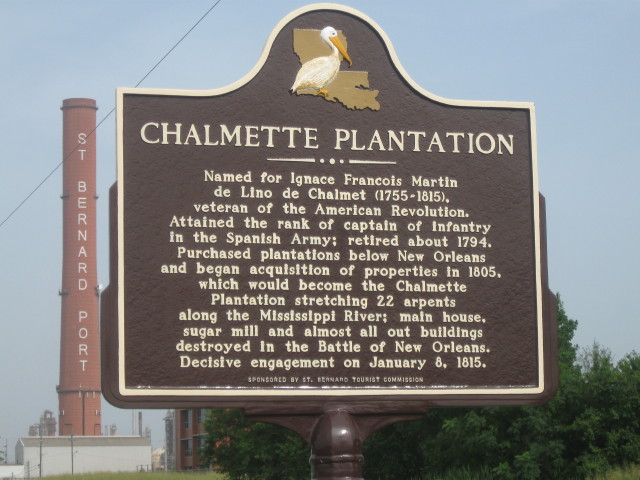
We were standing at the grave
site when the Park Ranger came by and told us the cemetery was
now closed for the day. We drove back to downtown New Orleans
while Dawn gave a narration of sights along the way. We saw the
new University Medical Center New Orleans, built with $1.1
billion of federal, state and private rebuilding money. In
addition to the UMC campus, a new adjacent U.S. Department of
Veterans Affairs hospital is slated to open next year. With a
price tag at $2 billion, the hospital corridor is one of the
largest public works projects undertaken during the
reconstruction from Katrina.
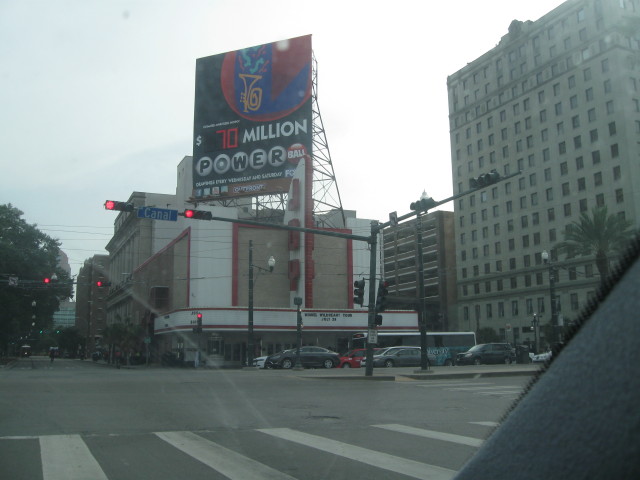
Joy Theater.
This 1940's movie palace has been revamped as a multi-use facility
for musical, comedy and theatrical production.
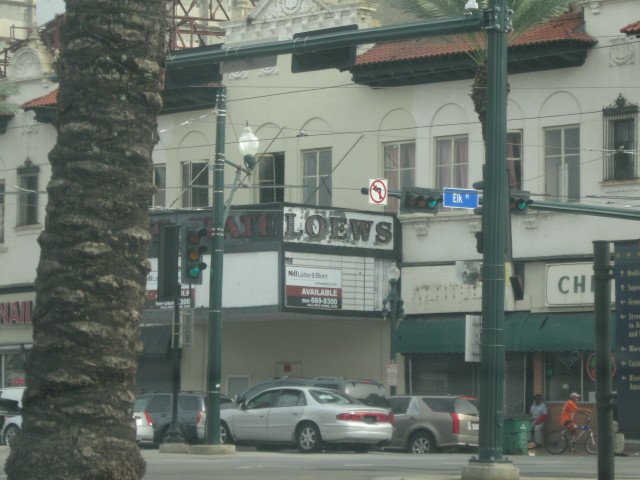
Near Lee Circle we got out of the car and walked around to look at
the museums in this area. Also nearby is the National WWII Museum
which I hear is a great visit.
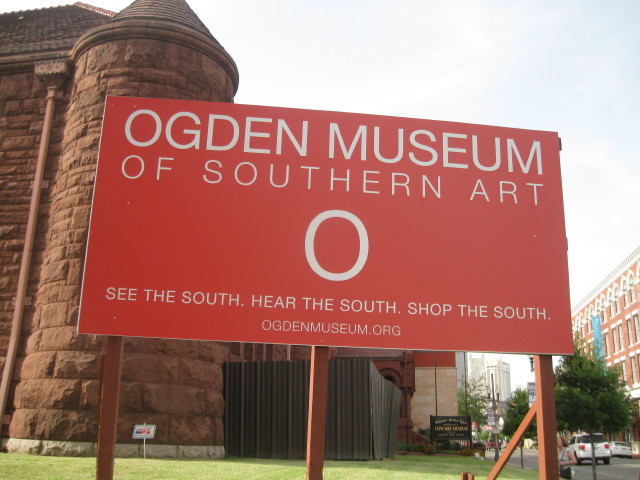
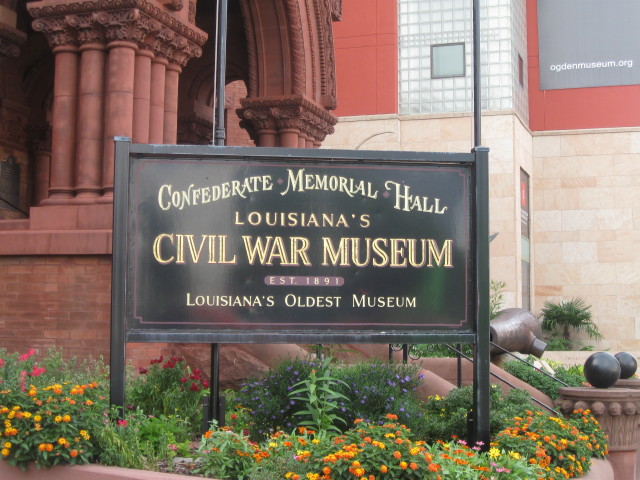
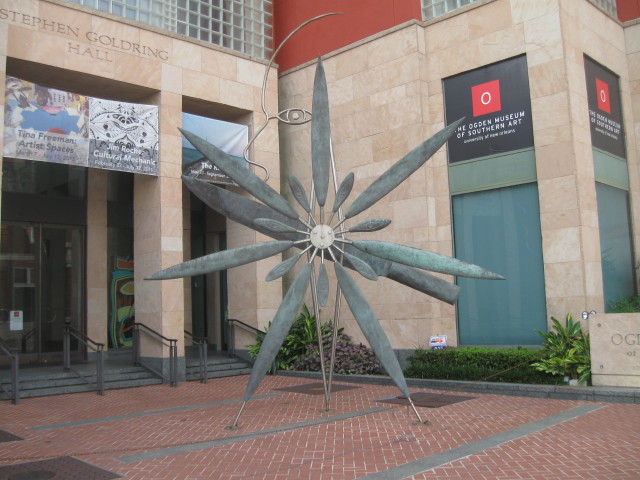
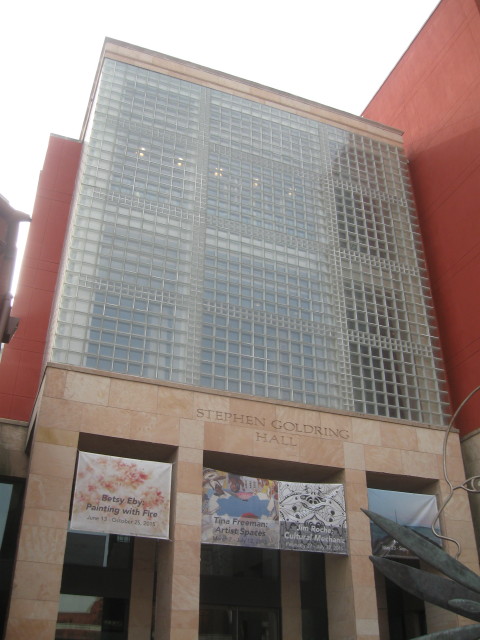
From here we drove over to the Garden District where she showed me
the school her daughters had attended and then we stopped at this
house.
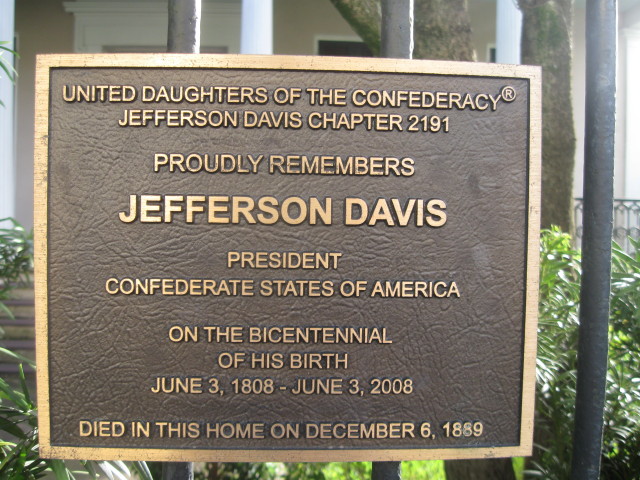
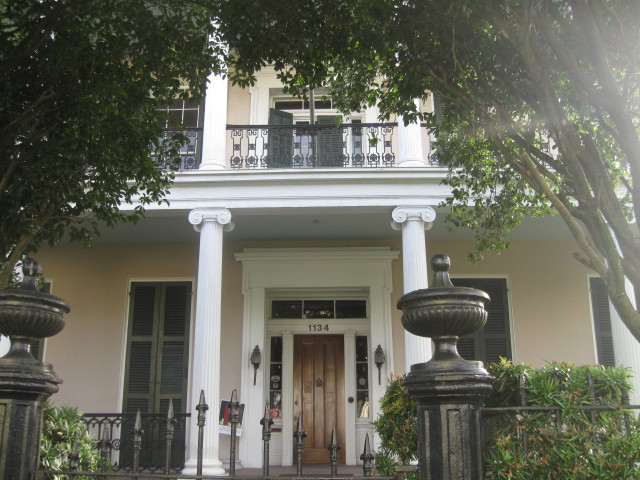
Payne Strachan House 1134 First St.
The President of the
Confederate States of America, Jefferson Davis, died in this
house in December, 1889. He had been traveling to New Orleans to
give a lecture and became ill. He was brought to this house
owned by Judge Charles Fenner and promptly died. When you look
up, notice the sky blue ceiling of the porch gallery. The color
is believed to keep winged insects from nesting there and to
ward off evil spirits. Many Garden District homes adhere to this
tradition.It is called Haint Paint.
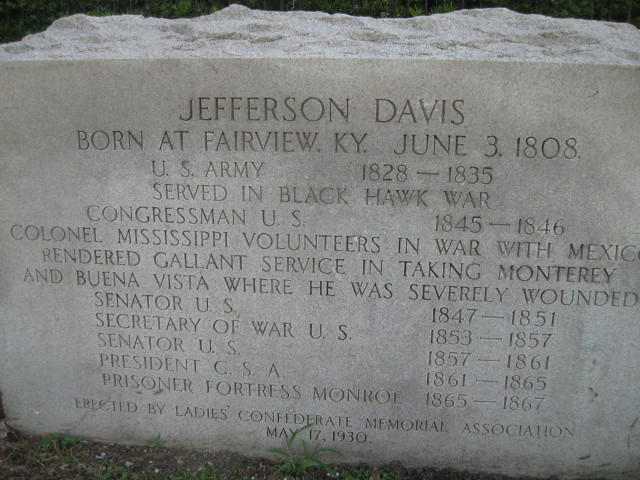
After this stop we went to her home going through City Park
stopping to take some photos of the tress and the moss.
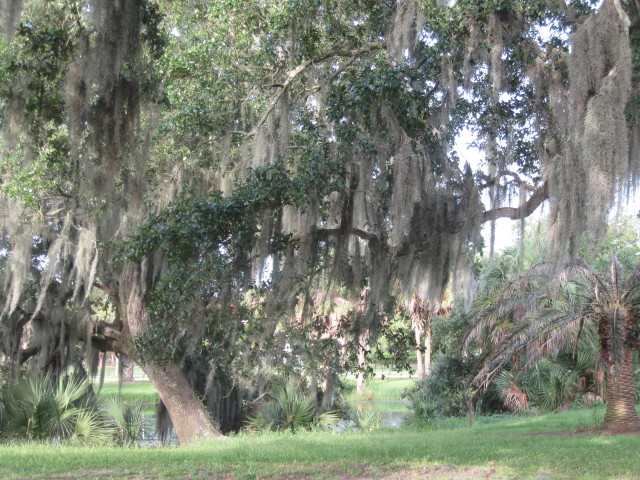
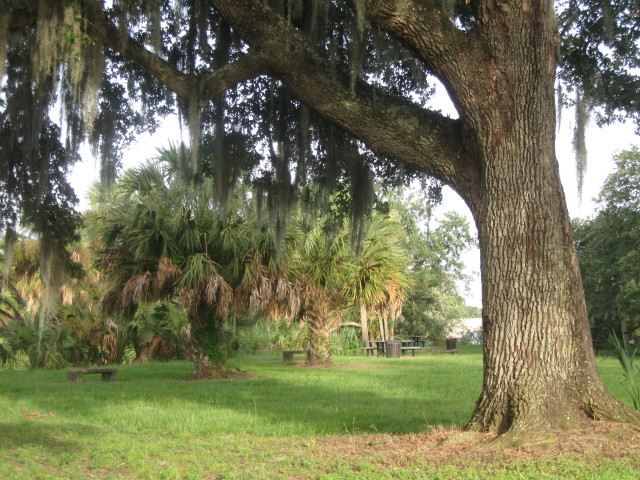
Arriving at her house, John, her husband was going to get the
barbecue ready, so Dawn and I walked around her corner to
Lakeshore Drive and Lake Pontchartrain.
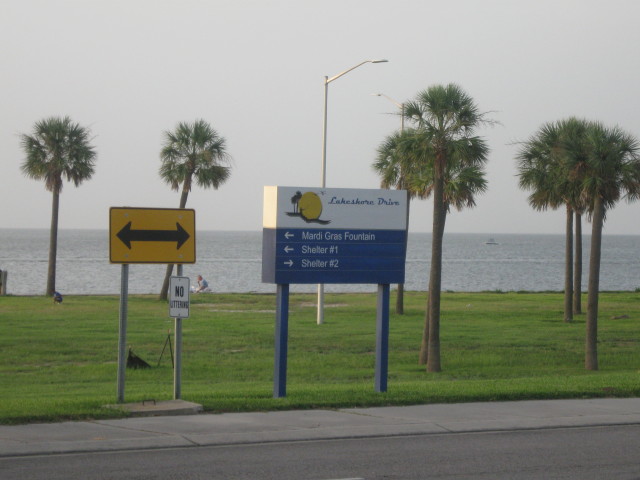
From here we headed to the Mardi Gras Fountain.

Flood control work on the Orleans Canal.
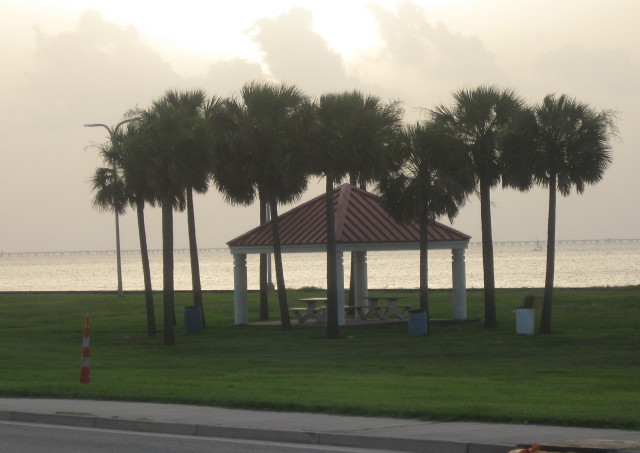
Lake Pontchartrain Causeway seen faintly in background.
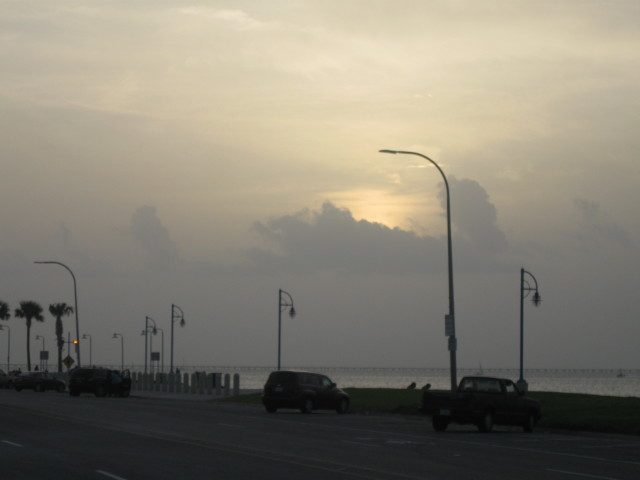
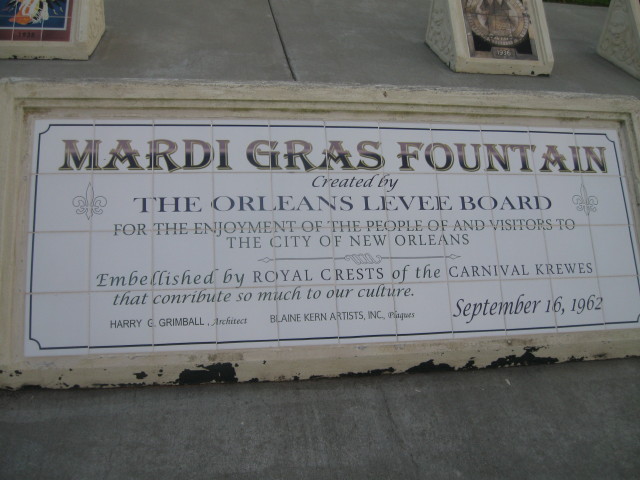
GPS 30 01.690N 90 05.969W
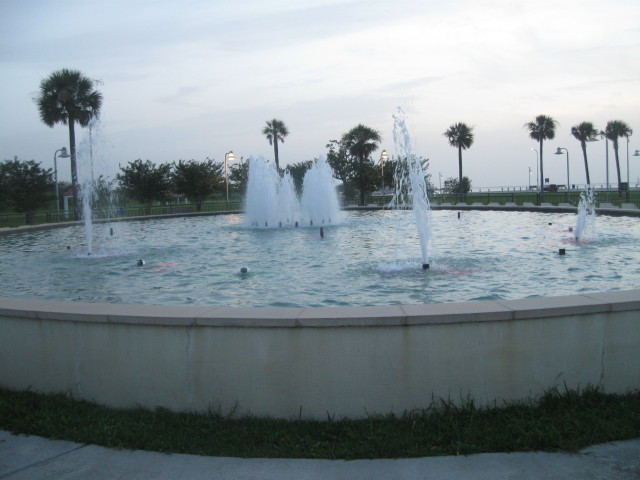
Mardi Gras traditional colors are green, purple and gold.
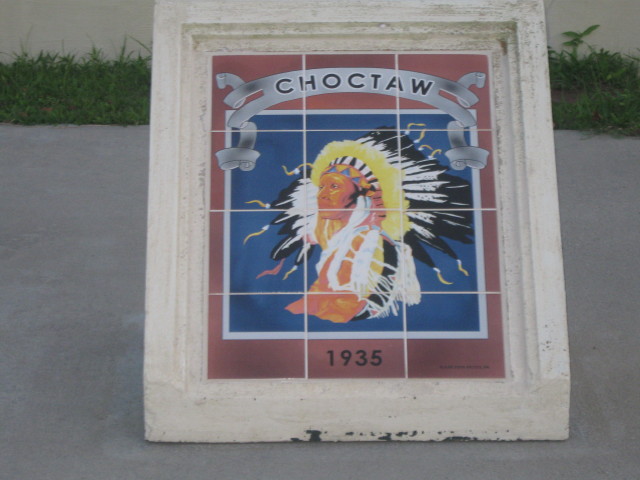
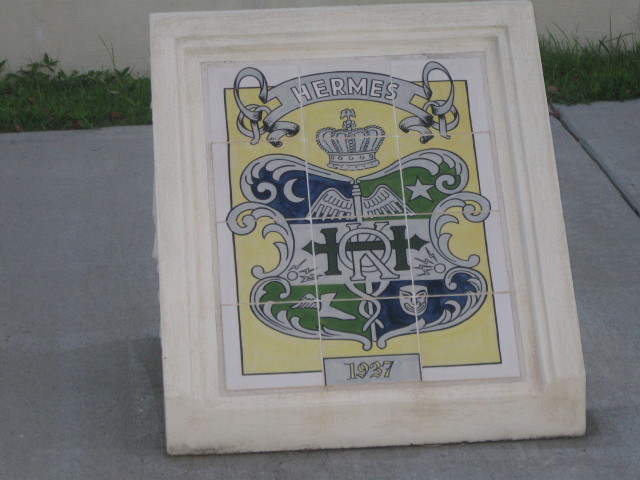
Dawn's husband has been a member of this krewe for many years.
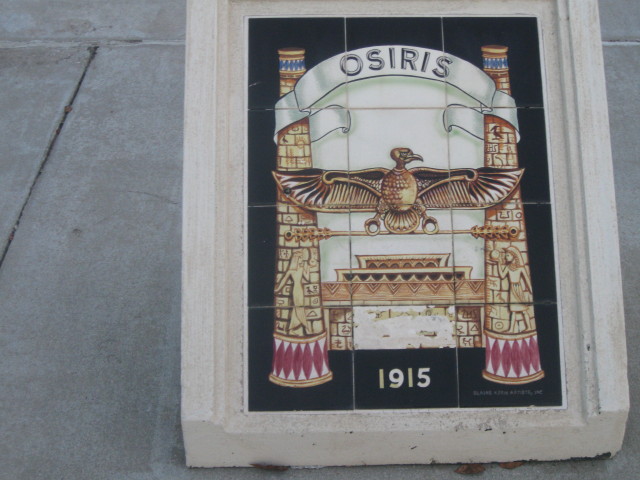
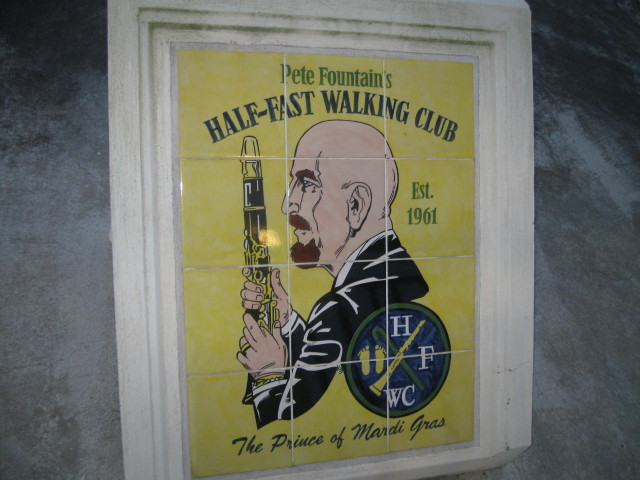
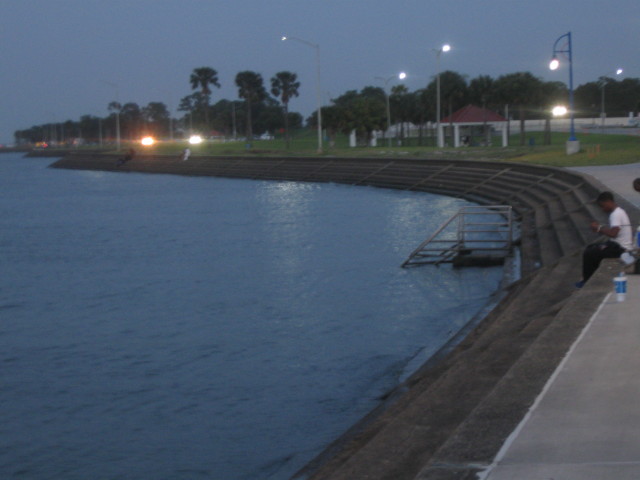
Leaving the lake we walked back to her house as she pointed out
Pete Fountain's house, a few doors down from her. After dinner
Dawn drove me back to my hotel and I turned in after a busy first
day in the Big Easy.
Tomorrow: Big Easy Day Two.
Walking tour of the Garden District, Lafayette Cemetery No.1 and
Chalmette Battlefield.
Go to the next
Chapter - Twenty - seven
Return to last
Chapter - Twenty-five - Day on the Crescent
Robin's trips
Home Page

